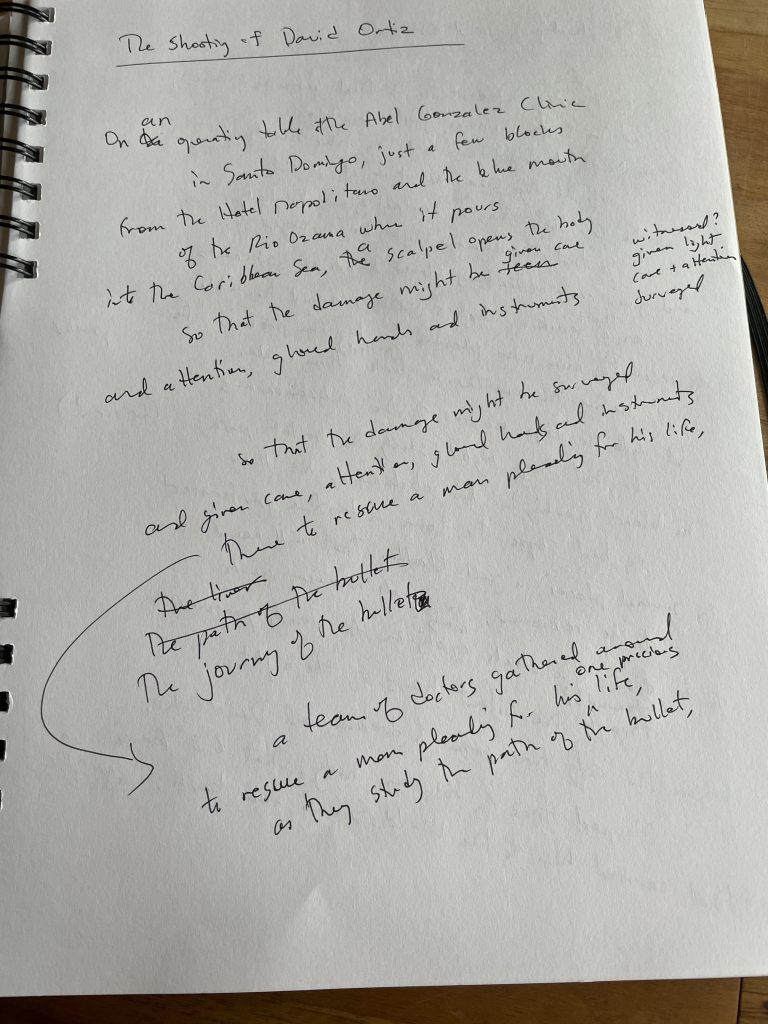Brian Turner
“The preparation is like making a soup. You start throwing ingredients in…you move it around and just start to put in all of this information and the day you start shooting, you drink it. And then forget about it…you don’t have to be thinking about it, it’s just going to be in you and hopefully something real will come out of there. I believe in that. That preparation is the most important part.” —Penelope Cruz
Nearly a decade ago I was in Sweden doing a book tour for the translations of my second book, Phantom Noise, into Swedish with Oppenheim forlag. Ilyse and I were on a northbound train from Stockholm to Uppsala, and I remember thinking I’d like to write a book of poems about baseball. Connected to the game, but not necessarily focused wholly on the game itself. I thought up some titles to potential poems and wrote them in my notebook. I thought I’d give myself a kind of ‘field of play’—and so I thought 27 poems would do it, as that’s the number of outs a team has before the game ends (unless the score is tied and it goes into extra innings).
I share this because for this challenge with the Fresno 15 I’m writing poems off the cuff, fresh, raw, brand new. And yet. These poems, in some ways, have long before been seeded deep within the imagination. They’ve been doing their work. Forming the soup, as Cruz describes in the quote above. These poems are alive inside of me. I often find that if I can find the right doorway in—then the poem seems to unspool outward and onto the page. I’m assuming this is how you write, too, but I really have no idea. So rarely do we get a chance to sit beside the author as she works at her desk, or as he paces the room, repeating the lines over and over until the body has memorized the rhythm.
For this poem, I initially thought I’d begin in the bar in the very moment that the assassin attacked Ortiz, or Big Papi, as he’s known. As I mulled it over, something about that just didn’t work, even as I began to ‘see’ the scene in my mind’s eye—as if I were standing in the room like a ghost, a witness, an observer. I realized that this lens into the experience might lean more toward a study of violence, and the shock of the action itself. I’m more pulled to learn about the experience of trauma. One of the men involved in the shooting (though this is debated some), Luis Alfredo Rivas Clase, was shot to death just last month. He was known as ‘El Cirujano’ (The Surgeon)—and something about this made me think about the actual surgeons who operated on Ortiz. And so that lead to more research on the drive to the clinic, the doctors there and press conferences, etc.
Once I had the first line come to me, the poem took off. Some of it near the end came so quickly I switched over to the laptop because my pen was too slow.
The Shooting of David Ortiz
On an operating table at the Dr. Abel Gonzalez Clinic
in Santo Domingo, just a few blocks
from the Hotel Napolitano and the blue mouth
of the Rio Ozama where it pours
into the Caribbean Sea, a scalpel opens the body
so that the damage might be surveyed
and given care, attention, gloved hands and instruments,
as a team of doctors gathers around the table
to rescue this man who pleaded for his one precious life
before the anesthesia took him under
and into the deep waters of the subconscious, a mask
placed over his nose and mouth so that oxygen
might fill his lungs and give him time to fight,
so that they might study the path of the bullet,
the blood pooling in his abdomen, his liver
in bad shape now, the lower intestine perforated
in several places, a gall bladder that will need
to be removed, so much work to be done
as the clock cycles forward in its steady progression
through the silent hours of the night,
the city around them having drifted off into dream
while David Ortiz has slipped free of his own body,
that 6’3” frame that carried him to the World Series
and back again, and he wanders through the shadows
of buildings, he visits the men who set this conversation
with death in motion, who lifted a 9mm pistol
to pull the trigger in its cold blue housing, these killers
who sleep on their sides now, curling into themselves
like unanswered questions, their bodies so fragile
in the half-light of this visitation, each of them
whispering something to him as he leans in to hear
what it is they are trying to say, though the gunshot
still rings in his ears, the world made silent by it,
and he can only watch as their lips sculpt
the invisible as it pours out of them, but if he could hear—
it wouldn’t be the sound of these men that calls him
back into the streets of Santo Domingo, he’d hear
the nightbirds flying over the city, that slow rowing
of their wings through the dome of light the city casts
over itself, and if he listened hard enough, maybe,
he’d hear the voices of loved ones praying
within themselves, calling out to God
that he might live, that David Ortiz might rise
once more—and walk into the rest of his life.




